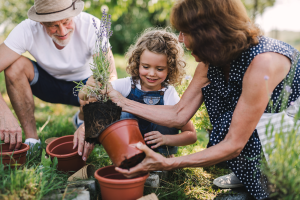Plan to a T
Prepare your garden to maximize energy efficiency
In addition to bringing you pleasure, your garden can help save you energy – or provide you energy if you grow a vegetable garden.  Smart planning in advance can help you create an energy-efficient garden that will last all season long.
Smart planning in advance can help you create an energy-efficient garden that will last all season long.
Take advantage of rain barrels
A rain barrel can save you a significant amount of energy. For each inch of rain that falls on 500 square feet of roof, you can collect about 300 gallons of water. In most areas of North America, you can collect more than a thousand gallons of water each year to use on your containers, houseplants, garden or even your lawn.
Also, be sure to water during the coolest parts of the day (typically mornings and evenings). It saves energy because the cooler weather doesn’t cause evaporation to occur as quickly as the intense heat during the day.
Invest in energy-efficient lighting
At 10 times the efficiency of incandescent lights, LED lights are a great option for outdoor lighting. There are thousands of options for solar-powered garden lights on the market. You can have a beautifully lit garden without racking up big electrical bills. Whatever lights you choose, always remember to turn the lights off when they’re not in use.
Mulch your beds
Mulch is a gardener’s best friend. It helps cut down on water evaporation and slows weed growth. It also helps improve soil quality and gives your yard a clean, organized look. Add a layer of mulch at the start of your gardening season; you’ll be thanking yourself for the rest of the year.
Choose the right plants…
Planting drought-resistant plants like salvia, lavender, and ornamental grasses will help reduce your water use. These perennials don’t require as much watering compared to other plant species, and unlike annuals won’t require planting year after year.
…or the right garden
Even small yards offer plenty of space for a garden. Peppers, tomatoes, strawberries, blueberries and even some herbs will thrive in the summer. You can save money by purchasing seeds and allowing them to germinate in pots on your windowsills before transplanting them later.
A well-designed garden provides more than just aesthetics for your home. It’s an investment that can provide joy and even food all spring and summer. You can contact your local electric co-op for more tips and advice to improve your home’s (and garden’s!) energy efficiency.